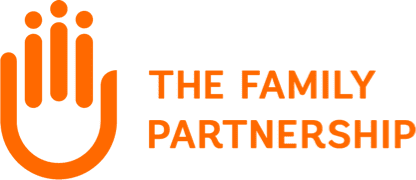We’d like to introduce you to Robert Pickering, Chief Financial Officer, who joined The Family Partnership in March. We asked Robert to share his background and his thoughts on what he hopes to accomplish at The Family Partnership.
Tell us about your background and what brought you to The Family Partnership.
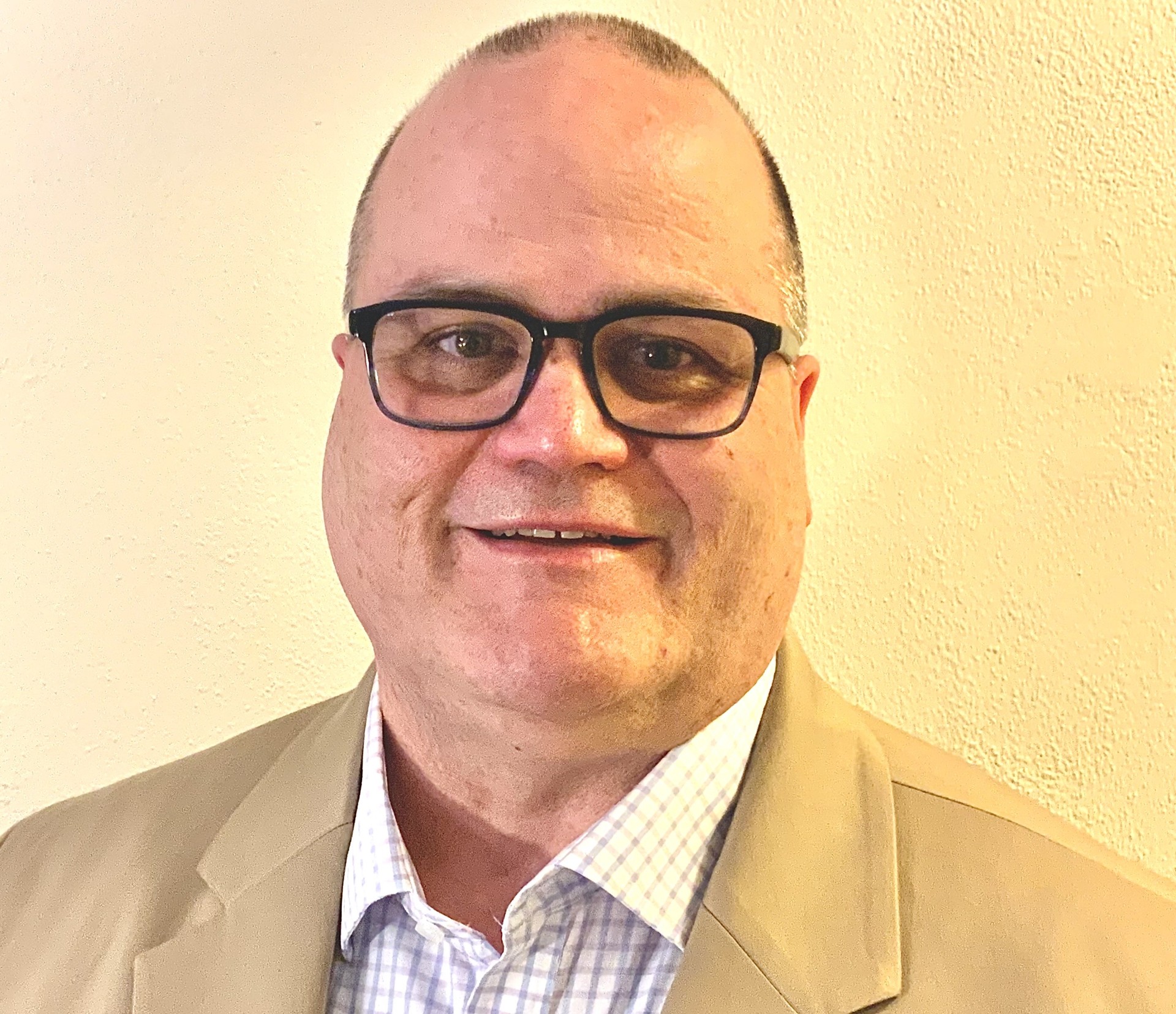
I have always been drawn to mission-based organizations and have worked in the nonprofit and social services sector my entire career. Most recently, I spent eight and a half years as the CFO at Accord, a nonprofit that supports people with disabilities, where I oversaw finance, IT, and facilities.
Prior to that, I was the Vice President of Finance and Administration at Lifetrack Resources, a Minnesota nonprofit that later became part of Lutheran Social Services. That’s actually where I first learned about The Family Partnership (TFP). Lifetrack also had a therapeutic preschool, and during that time, I had the chance to meet John Everett Till, TFP’s Chief Strategy Officer. He shared information about how best to create opportunities and positive outcomes for children in early childhood education programs.
Is there a personal experience or value that guides your approach to financial leadership in the nonprofit sector?
My path began with Community Action of Ramsey and Washington Counties in the early 1990s with the Head Start program. The Clinton Administration doubled the Head Start funding and I was charged with managing the budget, as well as finding classroom space and managing transportation, and food services.
Working with young children—many of whom were navigating difficult life circumstances—helped me see how early childhood programs like Head Start could offer equitable access to quality education. That sense of equity and fairness still guides my work today.
What excites you most about joining TFP at this moment in time?
The staff and leadership have been very welcoming. TFP has a rich history and strong reputation in the community, and I am looking forward to a new opportunity and challenge. We are creating systems and processes that will help the organization build financial resilience, make the best use of our resources, and help guide sound business decisions.
TFP is prioritizing financial stability in our bridge strategic framework. What would you say to funders, partners, and community members about the organization’s path forward?
We’re focused on being accountable and transparent with the resources entrusted to us. Our goal is to make smart decisions that maximize the impact of every dollar. I appreciate that TFP is located on Lake Street, rooted right in the heart of the community we serve. Our path forward includes continuing our community-centered programming. I also want to continue to figure out ways to support our early childhood programs.
Looking ahead, what are your top priorities for your first months/through the end of the year as CFO?
My primary focus is ensuring TFP remains financially sustainable to continue to serve the community for at least another 147 years. My goal is to help program managers meet their budget goals while creating the strongest impact they can.
Anything else to add?
I sit on the board of directors of Nonprofit Insurance Trust which provides liability and worker’s comp to nonprofit organizations. TFP is a member of that trust. I also sit on the finance committee for Emma North Services and on the executive committee for the Minnesota Multifaith Network.
I believe in and am committed to giving back to the community, both through my career and my volunteer work.
As we establish the financial foundation for our next chapter—we invite you to be part of it! Whether you’ve donated, volunteered, or just believe in our mission, your support clears the path for family success in Minneapolis. Sign up for our newsletter to stay informed and get involved.
Minnesota’s recent investments in early childhood have helped thousands of Minneapolis families living in or near poverty achieve significant milestones through The Family Partnership’s programs in 2024:
- 90% of children in our preschools graduated kindergarten-ready, nearly doubling the 52% rate of their peers
- 87% of children in developmental therapies met their treatment goals
Parents like Amanda Youlou have directly benefitted from these investments. She used and early learning scholarship to enroll her daughter, Lilah, at TFP’s top-rated Four Directions Preschool. Through play-based learning, healthy nutrition and nurturing care from her teachers, Lilah thrived. She also accessed onsite play-based therapy to help her cope with the death of her father.
“Lilah developed a love of learning at Four Directions,” shares Amanda. Today, Lilah is thriving in second grade, and Amanda credits The Family Partnership with helping her daughter build the confidence and emotional resilience she needed to succeed.
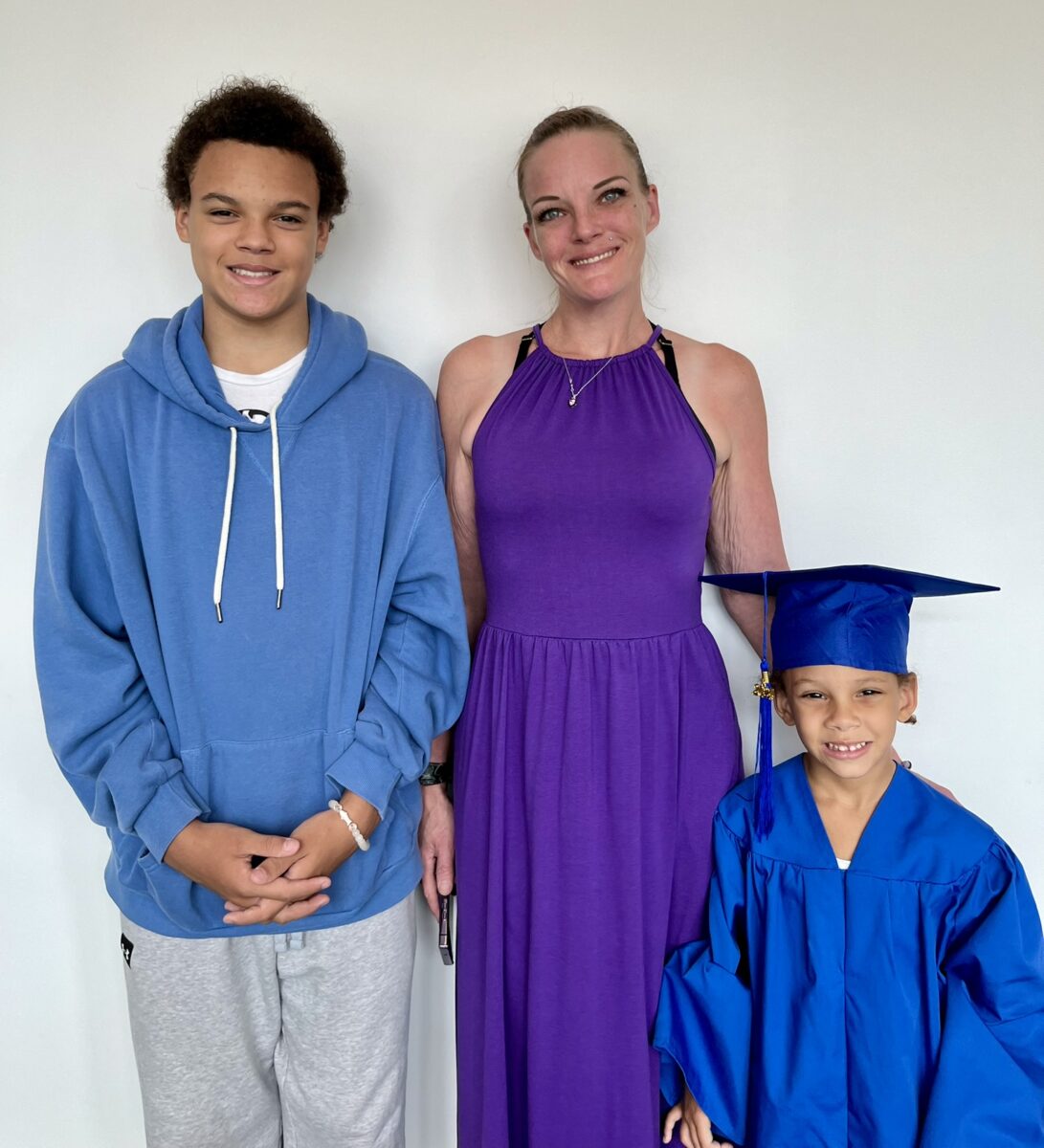
Research shows that children like Lilah who receive high-quality early childhood education experience positive outcomes in cognitive development. This is especially true for executive function skills that predict children’s academic achievements in K-12 education and, later, success in the workforce.
Early Childhood Investments in 2023 Fuel Minnesota’s Economy and Families, Highlighting the Need for Increased Funding in 2025
High-quality early childhood programs like Four Directions make it possible for parents and caregivers to participate fully in the workforce. “Without good childcare, you can’t get to work,” Amanda explained, “or you might have leave your kids with people you don’t know well.”
Without good childcare, you can’t get to work or you might have to leave your kids with people you don’t know well.
Amanda Youlou, parent
Workforce participation and affordable child care go hand in hand, especially for low-income families who otherwise spend an average of 36% of their income on child care. Studies show when child care costs are subsidized, parents and caregivers from low-income households are much likelier to remain employed, especially in full-time jobs.
In 2023 the Minnesota Legislature made historic investments in our state’s families and future by investing $1.3 billion over four years to early childhood education and care—one of the boldest commitments in the nation. These funds expanded access to high-quality child care and early learning programs, with key actions including:
- More funding to help families afford preschool and high-quality child care through Early Learning Scholarships (ELS)
- Expanded access to the Child Care Assistance Program (CCAP) that helps cover child care costs for more families
- Simplified application process to make it easier for families to qualify for financial support
- Increased payments to child care providers so they can keep offering quality care for families
While these steps made a difference, they do not fully address the needs of thousands of working families still struggling to find affordable, high-quality child care. Legislators from both sides of the aisle, including Rep. Nolan West (R-Blaine) and Rep. Carlie Kotyza-Witthuhn (DFL-Eden Prairie), are currently proposing legislation to expand Early Learning Scholarships to more families in need.
Child Care Shortages Cost Minnesota Families and the Economy Billions Each Year
It is important to sustain early childhood investments in 2025 including early learning scholarships. The demand for affordable, high-quality child care is rising as more workers return to the office. At the same time, every region in Minnesota is grappling with significant child care shortages that limit families’ options.
In 2024, first Children’s Finance estimated these shortages affected 89,528 Minnesotan children with working parents. Without better options, many parents stay home or reduce their work to part-time in order to care for their children. Some parents alternate working hours with their partners or other family members, missing out on important family bonding time.
The cost of insufficient child care in Minnesota affects families as well as businesses and taxpayers. Research shows these negative impacts total $2.1 billion in losses per year in Minnesota including:
- $19,610 average loss for parents in earnings and productivity each year
- $3,280 loss in revenue for businesses, per working parent
- $5,170 loss for taxpayers due to lower income tax and sales revenue, per working parent
These monetary losses have long-term consequences for children, especially those living in low-income households. Economic instability increases risks that children will experience hunger, homelessness or child maltreatment. In fact, poverty has the same harmful impacts as other Adverse Childhood Experiences (ACEs) like physical abuse or neglect. There are lifelong ramifications for children who grow up with toxic stress related to economic instability, including higher risks of depression, substance abuse and unemployment in adulthood.
Early childhood investments are some of the most strategic moves Minnesota can make for our short-term and long-term prosperity.
Early childhood investments are some of the most strategic moves Minnesota can make for our short-term and long-term prosperity. We’ll support this generation’s working parents while building a strong workforce for the next. These investments will continue to position Minnesota as one of the nation’s best places to raise a family and strengthen our economic growth.
Take Action: Advocate for Expanded Early Childhood Funding in 2025
Join The Family Partnership in raising awareness and support for early childhood investments. Here are just a few ways you can help:
- Join The Family Partnership this Thursday, 2/20/25 for Advocacy for Children Day at the capitol and make your voice heard
- Contact your legislators and encourage them to support funding (HF 470/SF 1049) for early childhood education.
- Sign up for our newsletter to stay informed about our advocacy efforts
The Family Partnership (TFP) is excited to welcome Julie Bluhm as our new Interim President & CEO. Julie brings expertise in guiding nonprofit organizations through transitions and aligning mission-driven work with sound business practices. Her leadership will guide TFP through the search for a permanent CEO and help us to continue building a strong foundation for the future.
Julie shared her enthusiasm and vision for her work with TFP:
“My goal during this interim period is to help connect the dots between The Family Partnership’s strengths and align this organization for the best outcomes. By the time TFP’s new leader arrives, we will be ready for the next chapter, and staff will feel rested, calm, fulfilled and excited about the future.”
My goal during this interim period is to help connect the dots between The Family Partnership’s strengths and align this organization for the best outcomes.
Julie Bluhm, Interim President & CEO
Introducing our Bridge Strategic Framework
In tandem with this leadership transition, TFP’s Board of Directors has adopted a Bridge Strategic Framework for 2025-2026. This forward-looking plan outlines five priority areas to guide TFP’s mission of building strong families, vital communities, and brighter futures for children.

Financial Sustainability
TFP is committed to ensuring its 146-year legacy of serving families and children experiencing intergenerational trauma, poverty, and adversity. Through flexible funding strategies, new revenue streams, innovative partnerships, and operational efficiencies, TFP will remain resilient and impactful amid an evolving financial landscape.
Organizational Health and Resilience
Recognizing the critical role of staff and board members in sustaining its mission, TFP will prioritize enhancing internal systems, supporting staff well-being, and strengthening board governance to navigate change with creativity and flexibility.
Intergenerational Impact through Services
Using a two-generation (2Gen) approach, TFP will continue to break cycles of poverty, adversity, and trauma by integrating services for both children and caregivers. Grounded in evidence-based practices, this approach addresses systemic racism and other barriers to create sustainable outcomes for families.
Thought and Practice Leadership
TFP remains committed to service delivery innovation and collaboration with local and national partners to drive improved outcomes for children and families.
Equity, Inclusion, and Anti-Racism
Dedicated to equity and inclusion, TFP will apply best practices in anti-racism within its operations and services while fostering leadership development across its staff and board.
Interim Leadership Builds a Strong Foundation for our Future
The Bridge Strategic Framework complements Julie Bluhm’s interim leadership by providing a clear and actionable roadmap for advancing TFP’s mission. Julie’s leadership philosophy is deeply rooted in helping organizations thrive during times of change:
“I’m really passionate about helping organizations connect their strengths and prepare for new leadership. If we do this well, we can ensure that the next leader’s skills, interests, and passions align perfectly with TFP’s needs.”
Julie’s prior experience includes serving as CEO of Guild Services, where she succeeded the organization’s founder. This experience gave her unique insights into the complexities of leadership transitions, inspiring her to help organize a support group for executive directors navigating similar journeys.
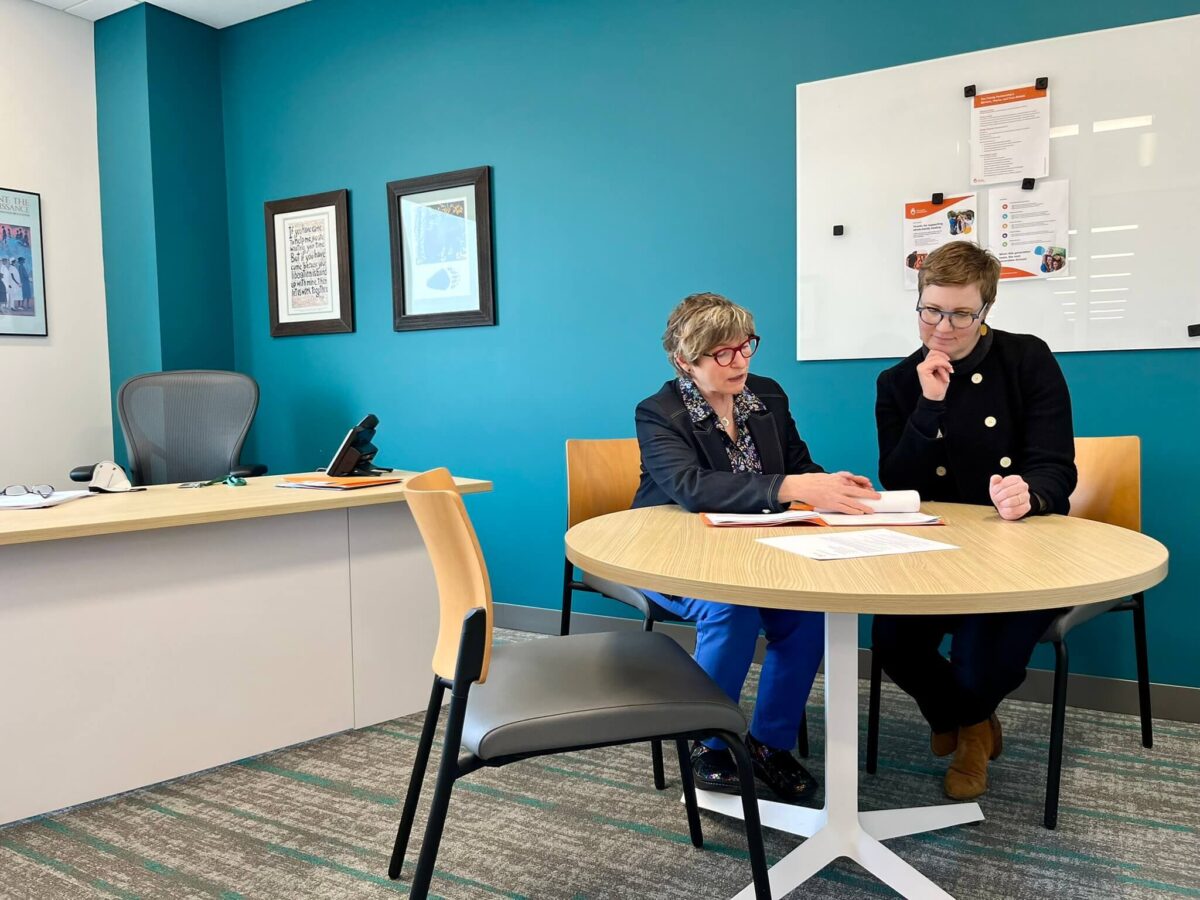
“The decision to hire Julie was made with great care and optimism for TFP’s future,” said Kit Briem, outgoing Interim President & CEO. “Julie’s leadership will provide the time and stability we need to thoughtfully select a permanent CEO who will steer TFP for years to come.”
As TFP searches for a permanent CEO, the organization is confident that Julie’s thoughtful, mission-driven approach—combined with the Bridge Strategic Framework—will position us for continued success in working to clear the path to success for children and families in Minneapolis.
As the new Vice President of Advancement at The Family Partnership, Ashley Hemnarine brings a wealth of experience and a deep commitment to our mission: building strong families, vital communities, and better futures for children. In this article, we’re excited to share Ashley’s story, her perspective on giving, and her vision for TFP’s generational healing work with individuals and families in Minneapolis.
From Letter Writing to Leadership: Ashley’s Journey to Advancement
Ashley’s journey to The Family Partnership (TFP) is rooted in her lifelong belief in the power of solidarity. Growing up in a diverse, under-resourced neighborhood in Newark, New Jersey, she became aware early on that not everyone had equal opportunities. She noticed disparities in healthcare, where families without insurance received lower-quality care at public hospitals. She also saw her mother facing discrimination; customer service representatives often berated her because of her accent.
Even as a child, Ashley showed concern for her community. In a letter to Santa, she requested, “I want everyone to be happy, world peace, and a Barbie.” She was fortunate to attend a well-resourced school and later enroll in college—experiences that helped her understand how different her life might have been without this access.
After earning her bachelor’s degree in psychology, Ashley went on to earn her master’s in health administration. While getting her master’s degree, she saw the ways in which healthcare systems perpetuate inequities and became disillusioned with the field. However, an internship at a hospital foundation helped her see the power of fundraising to meet the needs of organizations doing important work. Seeing how fundraising supports the missions of organizations that make real and concrete differences in people’s lives inspired Ashley to move into development.
After that experience and serving as a Development Associate for a nonprofit focused on strengthening health systems in sub-Saharan Africa, Ashley came to work at The Family Partnership in 2022, first as the Development Manager, then Development Director, and now as Vice President of Advancement.
Advancing Solidarity with Minneapolis families and communities
When Ashley joined TFP, the organization’s 2Gen approach and the emphasis on generational healing resonated with her. “A lot of people I grew up with had very different lives because of where they lived and the generational trauma they had to deal with,” Ashley reflects. This perspective drives her work at The Family Partnership (TFP), where she champions equitable access to resources for all families.
The Family Partnership works in Minneapolis communities that face racial and economic disparities, in a state with some of the worst racial opportunity gaps in early childhood in the nation. While just 50% of children living in low-income households are kindergarten-ready, 100% of the children in our preschools graduate with the skills needed to succeed in school and life. When it comes to potential and promise, there is no difference between children in our preschools and their peers. The difference is access to high-quality early childhood education and care at The Family Partnership, as well as two-generation programs that support the whole family.
For 146 years, The Family Partnership has adapted to meet the changing needs of Minneapolis families and communities. A critical part of our success involves meeting people where they are at. This core value applies to participants on their healing journey, staff who bring their authentic selves to work, and donors who find their passion in making a social impact.
How Donors Support Generational Healing through The Family Partnership
Ashley is motivated every day to raise awareness and support for The Family Partnership’s generational healing work. She loves working with TFP because the organization practices what it preaches—it’s the how and the why of TFP’s work that she feels confident sharing with donors so that work can continue. “The Family Partnership truly cares about the people we serve and how we serve them. We engage people to ensure we are providing the programs they want and need.” Donors make it possible for staff at TFP to innovate and meet the goals and needs of Minneapolis families.
Ashley pointed to the example of Sofia Silva Zapatta, an outpatient mental health therapist with TFP, who noticed how stressed-out mothers were when dropping their children off for play-based therapy. Based on The Family Partnership’s two-generation approach, Sofia understood the importance of supporting parents and the role that plays in children’s mental health outcomes. In response, Sofia created a somatic yoga program that helps parents and caregivers build skills for self-regulation and stress reduction.
The program also opened doors for Sofia to build relationships with caregivers, who then opened up about their struggles. By learning more about the families’ experiences and challenges, Sofia was better able to work with children and connect families to resources. One mother in the program told Sofia, “Even though my kids have access to health insurance, I don’t have health insurance or access to mental health treatment. I never thought that getting help for me was even possible. Somatic yoga is a safe space where we can process our emotions and learn how to deal with our stress. I’m no longer alone. I’m heard…I’m seen…and me and my kids are healing!”
Individual donations to The Family Partnership are unrestricted, allowing us to be flexible and responsive to the community’s most pressing needs across all our programs. If a person can’t pay their rent one month or needs groceries, these funds allow TFP to help—after all, no one can begin a journey of healing without having their basic needs met first.
Ashley shares a few examples of other ways that donors have helped Minneapolis families:
- Mothers who experienced sexual exploitation found safe emergency housing through our anti-sex trafficking services
- Children in our preschools received essential screenings including vision, dental, and child development—removing a barrier for parents and caregivers working multiple jobs
- 152 families and 515 individuals received gifts through the holiday sponsorship
Expanding the Idea of Giving at TFP—and Beyond
In her role as Vice President of Advancement, Ashley is working to expand the idea of giving at The Family Partnership and beyond.
She says, “My superpower is being able to translate the work that nonprofits are doing in a way that helps donors execute on their passion on social issues and causes.” When she meets with a potential donor, she enjoys finding out what excites them and what they are passionate about. She believes in helping connect donors to the organizations that share their passion, even if it isn’t The Family Partnership. She said, “One nonprofit can’t do everything, so, we need to help each other out.”
My superpower is being able to translate the work that nonprofits are doing in a way that helps donors execute on their passion on social issues and causes.
Ashley Hemnarine, Vice President of Advancement
One thing TFP’s donors have in common is an understanding of and commitment to a 2Gen approach to healing.
Ashley also wants to connect with younger donors as well as black and brown donors. A report from Indiana University Lilly Family School of Philanthropy shows that there is an underutilized market of black and brown donors who are looking for organizations that serve their communities and have leadership teams that reflect them.
A report from Donors of Color Network finds, “Donors of color are generous and insightful, and because of their lived experiences, they have the potential to be a driving force behind massive change in the field of philanthropy and for equity and justice movements. Donors of color bring critical insights, resources, and talent to bear at a socio-political moment in which new ideas, investment, and innovation are more important than ever.”
Ashley said, “As a young, brown Vice President, I know that I can bring a different perspective across race, age, and geography, to connect with donors.”
To do this, Ashley believes in helping potential donors understand the needs of the community and the impact smaller gifts can have. She also emphasizes that charitable giving is not just about what someone can give financially, but also what they can give in terms of their time and expertise.
- People can donate as little as $10 per month
- Host a gathering to assemble hygiene kits for one of TFP’s programs
Donors and volunteers are especially important post-COVID, since individual giving in the U.S. has declined for the first time since 2012. In 2023, 1 out of every 5 individual donors to The Family Partnership gave less than $100. Giving time is another way to make a big difference. Last year, more than 300 volunteers generously served children and families working with The Family Partnership.
“We are living in a time when anyone can give, not just the wealthy,” Ashley said, “Everyone can give in a way that is personal and meaningful.”
Looking for a way that you can make an impact? Visit our Ways to Give page to learn more.
Guided by our mission to build strong families, vital communities, and better futures for children, The Family Partnership is announcing strategic changes to sustain our 146-year legacy of service and advocacy with families in Minneapolis.
In 2025, we will consolidate all programs at our South Minneapolis headquarters. As part of this transition, we have made the difficult decision to close our North Minneapolis building, which currently houses multiple programs including our North Minneapolis Preschool. The final day of programming for North Minneapolis Preschool will be June 13, 2025. Families with children enrolled in the preschool have already been informed by TFP staff and provided with next steps. The other North Minneapolis programs will move to our South Minneapolis location but will continue to work with the clients they currently serve.
While change is not always easy, and these were tough decisions, we are confident that this will strengthen our overall financial sustainability and focus resources where they are most impactful. By uniting our team under one roof, The Family Partnership will strengthen our position to meet the evolving needs and goals of families today and into future generations.
Please read on for a Q&A regarding this upcoming transition.
Together with our community, we are building toward a future where every family has the opportunity to thrive.
Q: Why did TFP need to make these changes?
A: The Family Partnership’s realignment is a mission-driven response to factors affecting human services nonprofits across Minnesota and the U.S. since the onset of COVID-19. Rising inflation, wage pressures, and declining philanthropic support have made it necessary to take swift and strategic action to ensure our programs are sustainable and effective.
As other organizations are reducing or closing programs, we are as dedicated as ever to helping families overcome systemic barriers to healing and well-being. Selling our North Minneapolis building is a necessary shift to reduce overhead costs and focus more resources on direct services for families. The sale will strengthen our financial position, prepares us for the next chapter of long-term planning and allows us to continue our work to serve families.
Q: How will the building sale affect families?
A: The North Minneapolis building currently houses several programs, including Behavioral Health, Family Home Visiting, and Early Childhood Education and Care. We are working diligently to find solutions and build partnerships that will keep these vital services accessible.
Early Childhood Education: The most significant impact is the closure of North Minneapolis Preschool on June 13, 2025. This decision was not made lightly. Financial realities, including increased operational costs, make it necessary to consolidate resources and focus on maintaining services in a single, financially sustainable location. We are working to minimize disruption for families by exploring options for transition to other local, high-quality programs. Our priority is to help families find alternatives that continue to support their children’s growth and education.
Behavioral Health and Family Home Visiting: Northside families will continue to access mental health, developmental therapies, and family home visiting programs as always. We are working closely with local partners to explore leasing options that will allow families who currently access in-person services to retain that option. Families will also continue to have options of hybrid and virtual services. While our staff will be relocating to our South Minneapolis office, the following programs will continue without interruption:
- Mental health therapies
- Developmental therapies for outpatient participants, as well as through our partnerships with La Creche Early Childhood Centers and PICA/Head Start programs
- Family Home Visiting including Parenting for the Future, Healthy Families America, Promising Practices, Parent Support Outreach Program and Parent Capacity-Building Program
Q: What can the public do to support TFP during this time?
A: We invite our supporters, donors and partners to stay connected and engaged with The Family Partnership. We believe in the power of our community to show up and ensure that essential human services, particularly in early childhood education, mental health, family home visiting, and anti-sex trafficking, remain strong and accessible to those facing the greatest barriers.
One powerful way to support TFP is through advocacy for increased public funding for nonprofits, which are often under-resourced despite their crucial impact. Donations, as well as active community engagement, are also invaluable in helping sustain these vital services for Minneapolis families. We encourage everyone to lend their support where it’s most needed, whether that’s through TFP or another nonprofit close to your heart.
Q: Who can I contact with questions?
A: Please feel free to contact us at communication@thefamilypartnership.org.
Trinette Potts, EGG Project Manager at The Family Partnership, is leading the 2024-25 pilot expansion of EGG Toolkit into preschool and Early Childhood Family Education (ECFE) sites across Minnesota. With over 24 years of experience in early childhood education, Potts is excited to bring this innovative curriculum to classrooms statewide, helping 3- to 5-year-old children build the executive functioning skills they need to succeed.
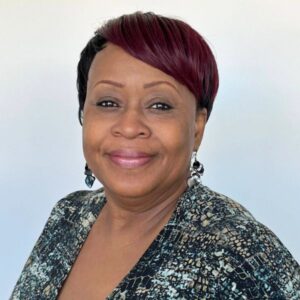
Trinette Potts, EGG Project Manager at The Family Partnership
“I’m passionate about this work because I’ve seen firsthand the impact EGG can have on kids and their teachers,” says Potts. “We’re dealing with a lot of dysregulation in classrooms, and this program provides the support both teachers and students need.”
Potts’ career began in direct care as the owner of a childcare business and grew into roles including director, business consultant, and professional development specialist. Her leadership in early childhood education is rooted in a deep understanding of the challenges teachers face daily. “We know teacher burnout is high right now,” she explains. “Many are leaving the field, and we want to give them tools to feel empowered in their classrooms.” Given her extensive experience in early childhood education, Potts is the perfect leader to oversee efforts to scale EGG Toolkit’s curriculum, training, and implementation in Minnesota.
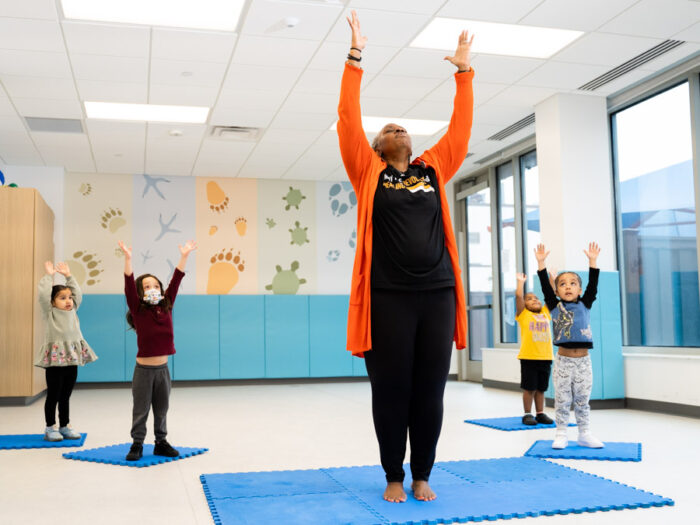
Mindfulness is one of the building blocks of executive functioning. Children use mindfulness skills to “re-set” and focus during stressful situations.
The history of hatching EGG
The Family Partnership designed EGG Toolkit (short for “Empowering Generational Greatness”) in 2017. The idea for EGG began when John Everett Till, Chief Operating Officer, learned that the earliest effects of childhood trauma manifest in the disruption of executive function development during the ages of 3 to 5 years.
According to Harvard Center for the Developing Child, “Executive function and self-regulation skills are the mental processes that enable us to plan, focus attention, remember instructions, and juggle multiple tasks successfully. The brain needs this skill set to filter distractions, prioritize tasks, set and achieve goals, and control impulses.” These early years are exactly the time when brain development is fastest and most foundational for building executive function and self-regulation skills and sets a foundation for children’s success in kindergarten and beyond.
John approached Christine Wing, CCC-SLP, PhD, about developing an early childhood intervention that could buffer children against the harmful effects of ACEs and boost kindergarten readiness. Together, John and Chris developed EGG in collaboration with early childhood educators and leading experts in brain science, child development, and curriculum design.
Today, EGG Toolkit is available in adaptations for preschools, home visiting programs and parenting groups. All variations focus on building executive function and self-regulation skills in children ages 3 to 5, with support from caregivers and educators. These skills are essential for academic success and overall well-being, as they help children manage their emotions, make healthy choices, and thrive in the classroom.
Developing an early childhood intervention for trauma
EGG is particularly effective in addressing challenges like Adverse Childhood Experiences (ACEs) by providing children with the language, storytelling, and mindfulness tools to navigate stress and trauma. These activities help foster a calmer, more focused learning environment, which in turn reduces behavioral disruptions and teacher burnout.
ACEs are traumatic events or experiences that occur in a child’s home or community. These can include abuse, neglect, and aspects of a child’s environment that impact their safety, stability, and sense of belonging. Family separation, racism, poverty, and community violence are also considered traumatic experiences.
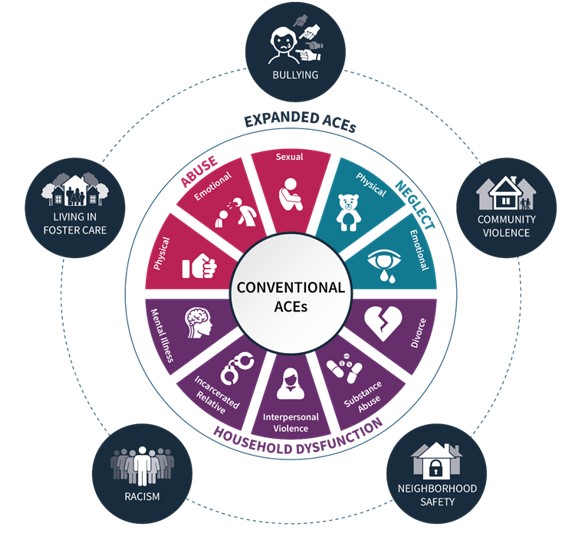
ACEs can include abuse, neglect and aspect’s of a child’s environment that impact their safety, stability, and sense of belonging. Graphic source: Minnesota Department of Health
ACEs are common. In fact, nearly one in two children (47%) in Minnesota report at least one ACE. However, research has shown that in Minnesota, American Indian and African American adults have three times the ACEs scores of their white peers. These early experiences of trauma and toxic stress impact a child’s developing brain and have lifelong consequences.
Research shows that the more ACEs a child experiences, the more likely they are to have negative outcomes in their lives including heart disease, diabetes, obesity, depression, substance abuse, and poor school performance. By building executive function and self-regulation skills, EGG Toolkit buffers against ACEs and supports healthier outcomes across a lifetime.
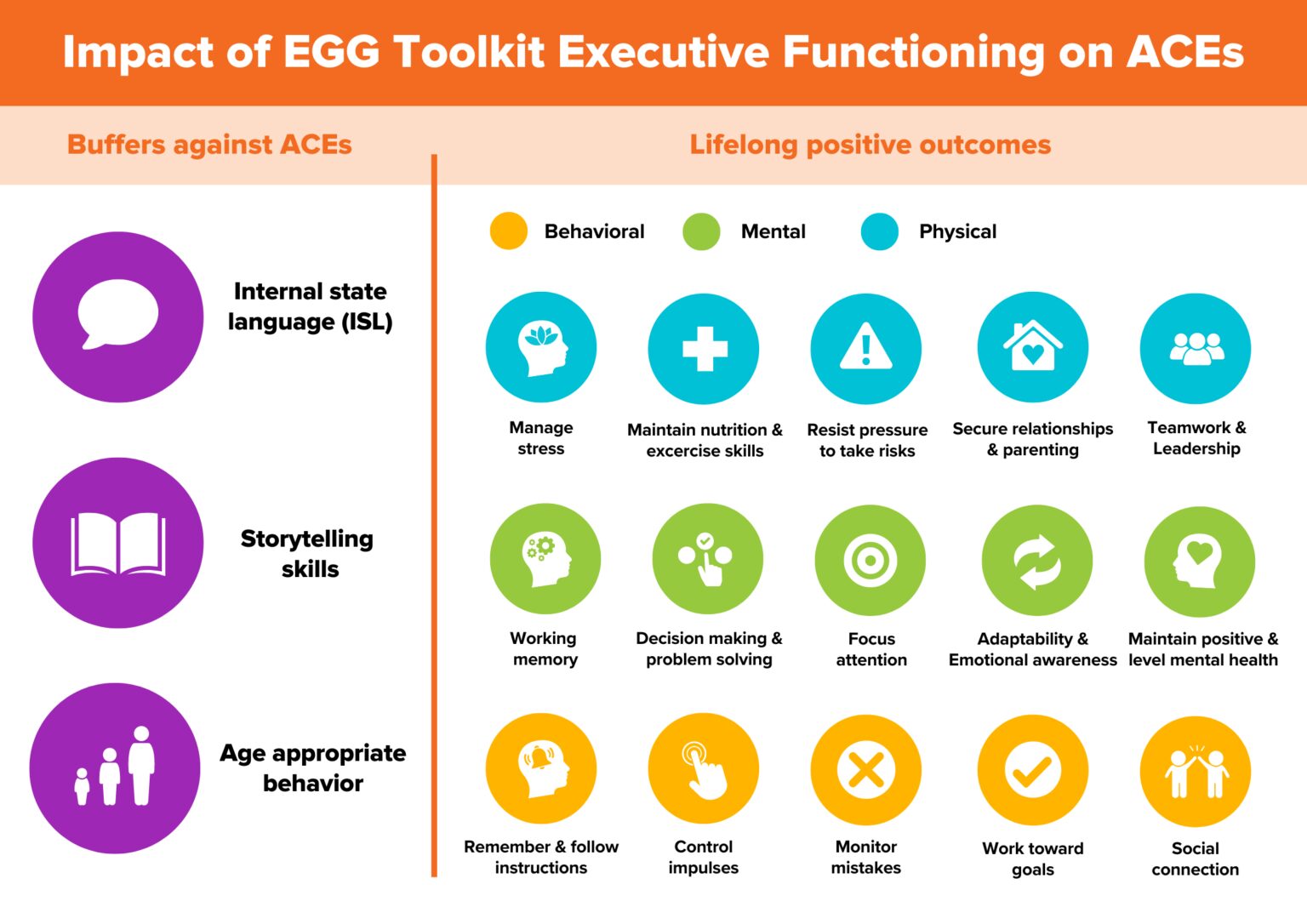
EGG helps to buffer children against the harmful impacts of ACEs, closing opportunity gaps in childhood and supporting a lifetime of better outcomes for physical, mental, and behavioral health. Graphic sourced from Center on the Developing Child – Harvard University
Creating a recipe for success in kindergarten—and beyond!
Opportunity gaps and disparities that result from inequity occur long before a child enters school. Early interventions like EGG help children develop essential skills for success in kindergarten, which predicts better outcomes throughout grade school and into their adult lives.
We’ve already seen amazing results from previous pilots. Kids who start below the national average in executive function are surpassing their peers after just a few sessions of EGG.
Trinette Potts, EGG Project Manager at The Family Partnership
“We’ve already seen amazing results from previous pilots,” Potts notes. “Kids who start below the national average in executive function are surpassing their peers after just a few sessions of EGG.”
EGG Toolkit addresses over half of preschool competency standards across multiple domains, supporting kindergarten readiness standards established by the state and assessments of a child’s total well-being and strengths. By building executive function and self-regulation skills, EGG helps children learn how to learn.
The benefits of EGG begin in the preschool classroom and they will continue as children grow up to become parents themselves. With greater capacities for resilience and focus, as well as language, storytelling, and mindfulness skills, parents can build more secure attachments. Their children also benefit from improved health, wellbeing, and prosperity.

Nurturing joy in preschool classrooms
The benefits of executive function and self-regulation skills begin in the preschool classroom, making EGG a critical support for educators in a challenging industry. Since COVID-19, Preschool administrators are seeing increased behavioral challenges and developmental delays that add to the stress of early childhood educators. According to a survey of early childhood educators in Minnesota by the National Association for the Education of Young Children (NAEYC) in the fall of 2022, 50.7% of respondents were experiencing staffing shortages. 74.7% of those surveyed were experiencing burnout and 35% were considering leaving the field.

“We know that right now in our field, there’s a lot of teacher burnout,” Potts said. “Teachers are leaving the field and there’s teacher turnover. We want teachers to be happy in the classroom.”
EGG Toolkit helps nurture joy in the classroom, because children have the skills they need to focus, plan, and regulate their emotions and behavior. As a result, they are better able to learn the material presented by their teachers and build positive relationships with their peers.
In just 30 minutes per day, evaluation from the University of Minnesota’s Center for Early Education and Development (CEED) showed that EGG Toolkit had positive impacts on age-appropriate classroom behavior. After using EGG, children increased age-appropriate classroom behavior by 7.4 points—a statistically significant change with a large effect size.
Preschool teachers reported that EGG also had a positive effect on their classrooms’ atmosphere. “I saw positive growth into putting names into emotions,” one teacher from San Antonio shared. “They don’t act out. They explain why they need space and are in tune with their feelings.”
By building focus and resilience, EGG supports positive learning environments for learners and educators.
We know that right now in our field, there’s a lot of teacher burnout. Teachers are leaving the field and there’s teacher turn over. We want teachers to be happy in the classroom.
Trinette Potts, EGG Project Manager at The Family Partnership
Promising results show the benefits of EGG Toolkit
Evaluation of our pilot programs shows that EGG Toolkit increases executive function skills, and these results are especially significant for children who have experienced household or systemic trauma. We have several years’ worth of data and outcomes, but these are some of the highlights from our research partners:
- The Center for Early Education and Development at the University of Minnesota found that EGG demonstrated a significant impact on emotional descriptive language, positive age-appropriate behavior, and personal narration—all highly correlated with executive function skills.
- Language sample analysis by Salt Software determined the complexity of children’s narratives increased after using the EGG toolkit.
- Results from the Minnesota Executive Functioning Scale app from Reflection Sciences showed that children who started below the age-adjusted median for executive function scored above the age-adjusted national median after using EGG.
Empowering Generational Greatness across Minnesota
Training for staff at our 2024-25 pilot sites has already begun. Preschools are expected to begin implementation this fall, and ECFE programs are slated for spring 2025. Based on our success in previous pilots, Potts is eager to see EGG reach more communities, knowing it has the potential to change the lives of children, families and educators.
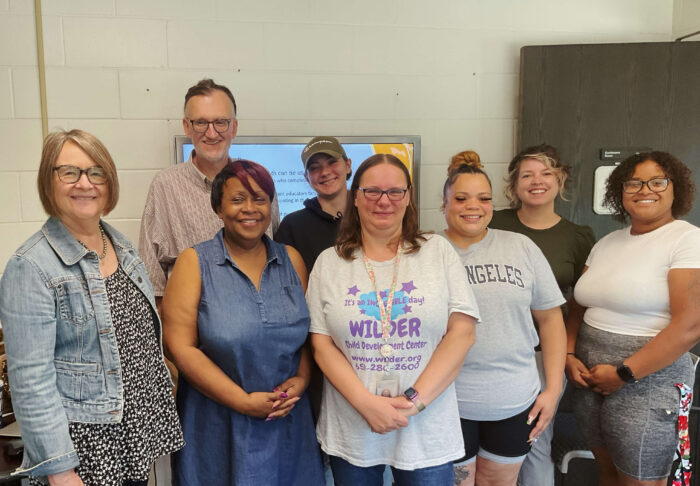
Trinette Potts, John Till and Chris Wing pause with staff from the Wilder Child Development Center during training in August 2024.
“This isn’t just about improving classroom behavior. EGG builds lifelong skills,” she says. “We’re also involving parents and caregivers in the process, so the benefits extend beyond the classroom.” According to Trinette, the importance of executive functioning is not known by many early childhood professionals, which is why she is so passionate about providing training to educators and staff. Participants in EGG Toolkit’s training will also receive credit that counts towards their development records and licensing requirements.
Potts said her favorite part of the training so far is witnessing the excitement of teachers. She said, “I love seeing the lightbulb moment for teachers. They get excited about the tools and how they can use them in their classrooms.”
One word that Potts uses often when discussing EGG Toolkit is “intentional.” The toolkit provides activities that help teachers, parents, and caregivers be more intentional in their interactions with children and that is why it works. For parents and caregivers participating in ECFE pilots, EGG Toolkit offers a 2Gen approach that builds awareness of executive functioning and skills the whole family can use.
Giving children and families the tools for executive functioning and self-regulation means giving them the skills to navigate the world. That changes the trajectories of families’ lives.
Trinette Potts, EGG Project Manager at The Family Partnership
By engaging parents and caregivers in the process, EGG Toolkit serves to strengthen bonds between family members—supporting a secure, loving environment for learning and growth. This is especially important for parents and caregivers who have ACEs themselves. Trinette said, “Giving children and families the tools for executive functioning and self-regulation means giving them the skills to navigate the world. That changes the trajectories of families’ lives.”
Visit www.eggtoolkit.com to sign up for our newsletter and learn more about how EGG builds lifelong focus and resilience in children 3-5 years old—and the adults who support their success!
In honor of World Mental Health Day on October 10, support Minneapolis preschoolers in play therapy and other healing programs at The Family Partnership!
Play therapy is proven to help children heal from trauma, process emotions, and improve disruptive classroom behaviors. Early interventions like play therapy at The Family Partnership help hundreds of young children in Minneapolis build a foundation for healing and success in school.
Just $20/day covers weekly play therapy that keeps a young child on the path to success.
Your donation will help children like Paloma
With teary eyes and an aching throat, four-year-old Paloma wondered why no one understood her and she was always getting in trouble. Her teacher, Mr. Dan, was soothing her best friend, who was crying because Paloma had gotten frustrated and thrown her shoe at her. Paloma had been trying to get her needs met in the only way she knew how – by screaming and reacting impulsively.
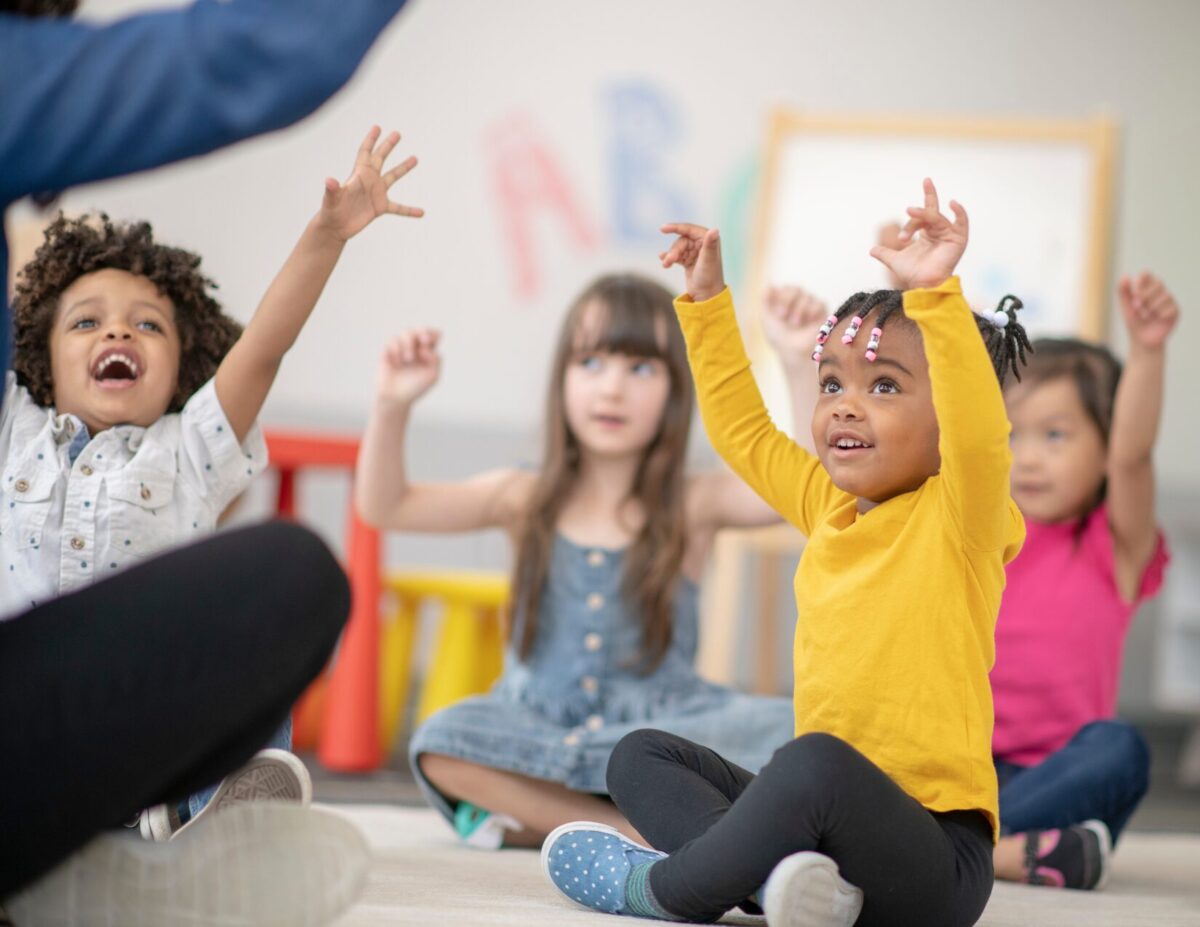
Paloma is a four-year-old student attending our preschools. For Paloma and hundreds of Minneapolis children, play therapy at The Family Partnership provides a safe place to express their experiences and feelings.
Thankfully, Ms. Sara walked into the classroom, and Paloma’s attention shifted. They went to a playroom where Paloma screamed, jumped and played without getting in trouble. She ran straight for her special toy. “Rawrrrr!” She ran back to Ms. Sara screaming with the stuffed tiger. “I eat you,” she said as she pretended the tiger was biting her. Paloma then slammed the tiger into a smaller toy repeatedly. Ms. Sara softly asked, “How is the tiger feeling?” Paloma looked up and said, “Feels icky and I want it out.” Ms. Sara ended the session by asking Paloma to take a few deep breaths before entering the classroom again.
Paloma had seen her family coping as best as they could through continued community gun violence and family instability. Spending time with Ms. Sara helped her process and make sense of these experiences.
As Paloma approached graduation this past August, her disruptive behaviors in the classroom occurred less frequently. Ms. Sara reported that Paloma now played with a kitten during therapy, showing her progress from aggression and frustration to calm and playful. She no longer threw shoes when she got frustrated because the preschool provided the space and support to work through her trauma and experiences. Even at her young age, Paloma now knew what she was feeling and how to talk about those feelings, including asking for help.

Now through midnight on October 10th, support Minneapolis preschoolers in play therapy and other healing programs at The Family Partnership
Together we can support early interventions that are proven to help children heal from trauma, overcome developmental challenges and prepare for lifelong success and well-being. Now through October 10th, your giving will support children like Paloma who attend play therapy, along with thousands of children and families who experience healing and growth in our programs.
On Saturday, August 17th, Minneapolis families gathered for a day of connection and community at our first-ever Community Resource Fair. Held at TFP’s South Minneapolis location on East Lake Street, this event featured free food, family-friendly activities, giveaways and games—while providing families with an opportunity to explore a wide array of services and resources.
A Day of Connection and Community
To host this event, The Family Partnership teamed up with Raise the Barr, a 2Gen nonprofit co-founded by NFL Linebacker Anthony Barr. We developed this resource fair for all community members, with a special focus on families who are facing to healthy food, housing, medical care, and workforce mobility.
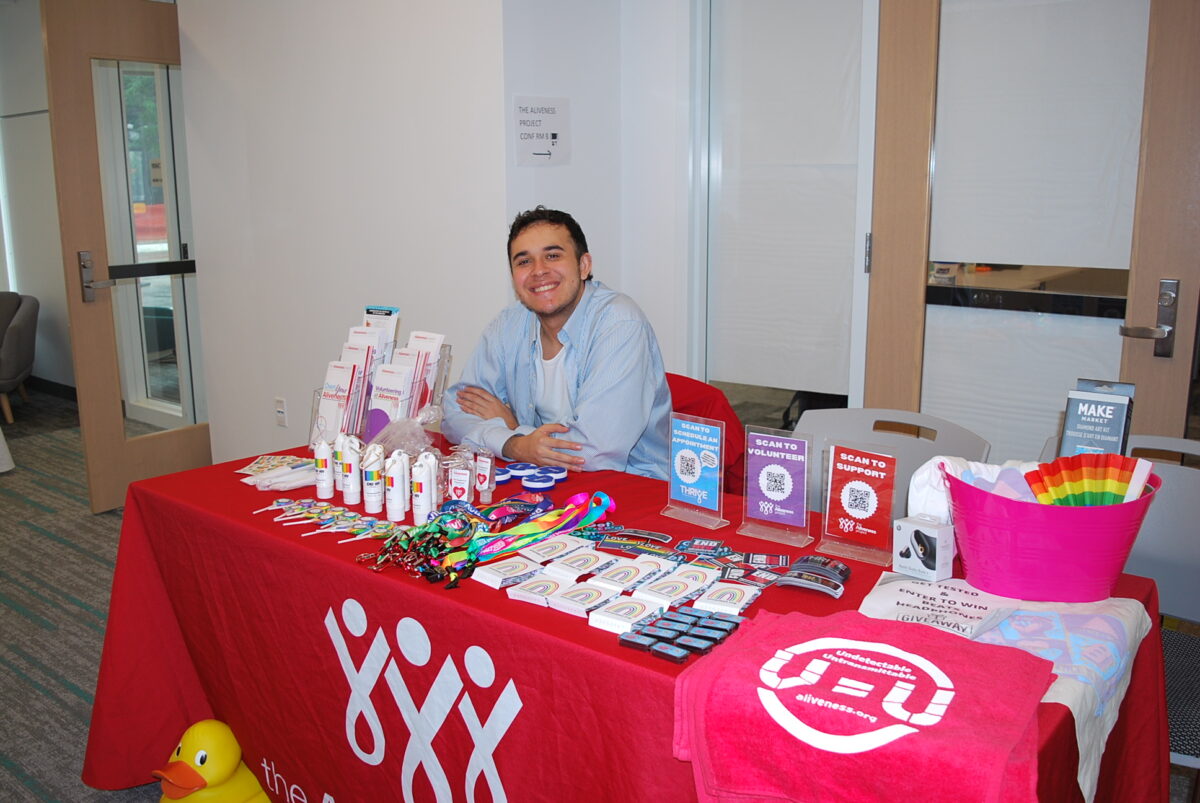
For Ashley Hemnarine, Vice President of Advancement, the Community Resource Fair reflects a core value of The Family Partnership, to “meet people where they’re at.” This value serves our larger commitment to generational healing and wellbeing in Minneapolis.
“Basic needs are one of the most important aspects we’ve been hearing about from families,” Ashley shared. “In order to move from a survival mindset to a healing mindset, folks need to have their basic needs met.”
At the Community Resource Fair, hundreds of individuals and families accessed a wide array of services and resources from local organizations, including:
- 4Evr Sale’ing: Clothes
- A Book of My Own: Children’s Books
- The Aliveness Project: HIV testing
- Art of Counseling: Mental health resources
- Central Minnesota Legal Services: Legal aid
- Emerge Mothers Academy: Resources for single mothers
- Great MN Schools: Education resources
- Hennepin County: Childhood Immunizations, child and teen checkups, mental health assessment scheduling, safer sex supplies
- Hired: Career services
- Minnesota Vikings: Lunch from Vikings Table
- NAMI : Mental health resources
- Open Arms: Nutritional resources
- Our Streets: Games and community resources
- PFund Foundation: LGBTQ+ scholarships and resources
- Phyllis Wheatley: Education resources
- Sabathani Community Center: Food
- Think Small: Early childhood resources
- Transforming Families: Gender identity resources
- Twin Cities Food Justice: Groceries
- The Upton Program: Tools for parenting and pregnant youth
Free Food and Family Fun
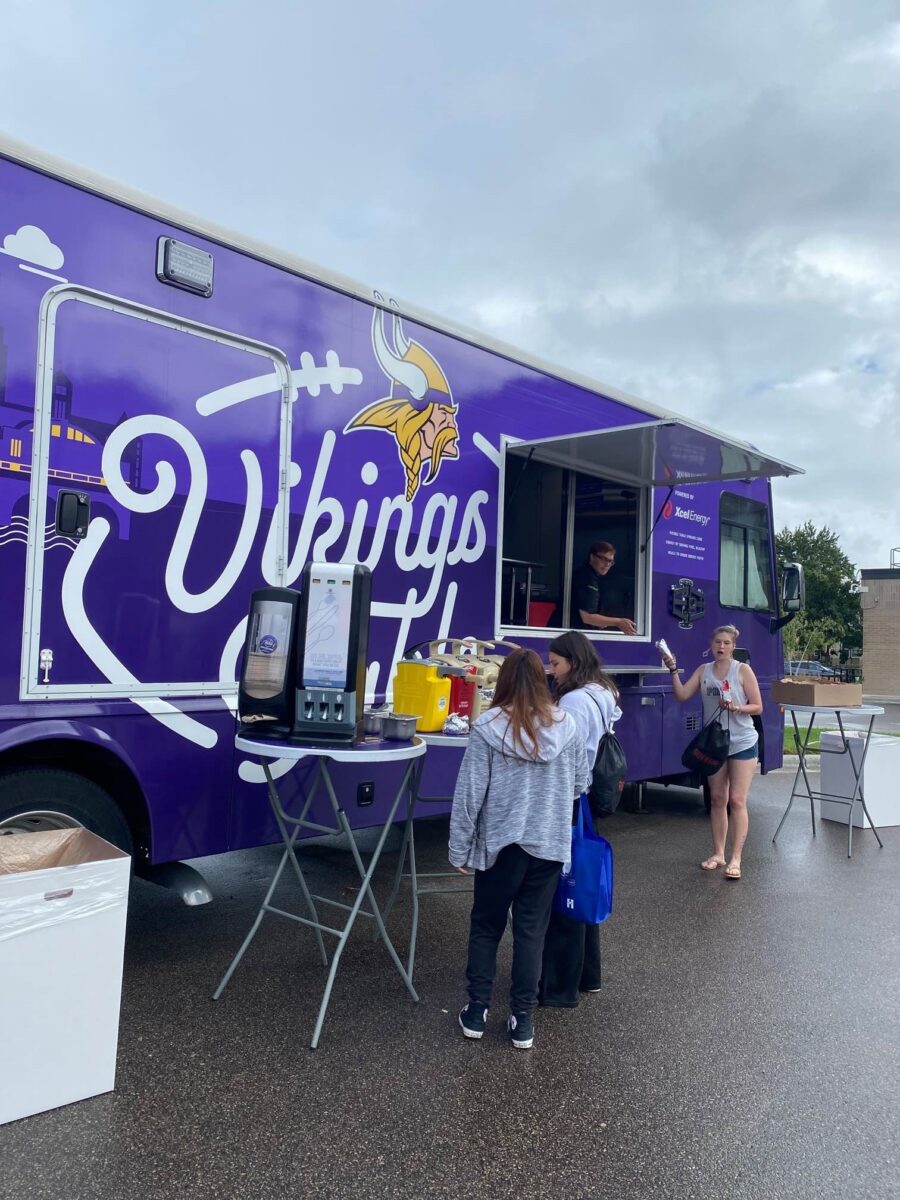
Families who attended our Community Resource Fair enjoyed free burgers and hotdogs courtesy of Vikings Table, the Minnesota Vikings’ food truck. Elsewhere in the parking lot, children jumped in a bouncy house and drew colorful chalk art while their parents and caregivers met with staff from The Family Partnership and representatives from partnering organizations. Inside the building, children chose unique designs for face painting by Phyllis Chatham—everything from Princess Elsa to spiders—and picked out books supplied by A Book of My Own.
Being in community heals us. We are grateful this building is becoming a gathering place for groups, ideas, family resources and joy.
Ashley Hemnarine, VP of Advancement
Meanwhile, grownups had the opportunity to browse clothing items from a clothing drive held by the Advancement Team of The Family Partnership and stock up on grocery bags full of fresh produce provided by Twin Cities’ Food Justice. Families also scored some great take-home gear from our partners including water bottles, sunglasses, snacks, and fidget toys.
Supporting Family Strength Every Day
If you missed the event, don’t worry! The Family Partnership offers services year-round, as do the organizations that partnered with us for the event. At The Family Partnership, more than 3,500 children and adults engage with our 2gen services to heal and build lasting strength.
Our core programs areas include:
- Early Childhood Education and Care
- Mental Health Therapies
- Family Home Visiting
- Anti-Sex Trafficking
If you have questions about which programs are the best fit for you and your family, feel free to contact us. Our team is available to answer questions and help you find the best support for your family’s unique needs and goals.
You can also connect with more resources and services at The Family Partnership’s monthly Community Health Fair, hosted at our South Minneapolis location. Upcoming dates are available on our Events Page. Regular services and resources at our monthly Community Health Fair include:
- COVID-19 vaccines
- MPox vaccines
- Hennepin County nurses
- Rapid HIV testing and safer sex supplies
- STI and HEP C testing and follow-up care
- Wound care
- MNSure health insurance navigation
- Coordinated entry housing assessments
- LGBTQIA+ resources
- Anti-sex trafficking resources
- Legal resources
- Information about recovery and Medication Assisted Therapy
- Naloxone
- Snacks
Generational Healing, Step by Step
Our Community Resource Fair celebrated the healing power of community in south Minneapolis. In this event and our daily work, we are here to help families build a legacy of generational healing and wellbeing. We want to give a shoutout to the amazing volunteers who helped to make our first-ever Community Resource Fair a safe, welcoming, and successful experience for children and families. From set-up and take-down, bouncy-house-supervising to helping visitors navigate the building…we couldn’t have done it without you!
To learn more about volunteer opportunities that support generational healing in Minneapolis, click here.
As I prepare to transition from my role as President and CEO of The Family Partnership, I am filled with a mixture of gratitude and anticipation for the future. I am honored to announce that I will be stepping into a new role as Assistant Commissioner of the new Department of Children, Youth and Families. I am excited that this new position will allow me to work on systems change for children and families at a statewide level – changes I am hoping will benefit the families and children we serve at TFP. This decision was not made lightly, and I am confident that TFP is in a strong position to continue its vital work in our communities.
Reflecting on my tenure over the past two years, I am most thankful for the opportunity to work alongside such dedicated and excellent staff. The relationships I’ve built with families, community members, donors, volunteers, and partner organizations have been deeply rewarding. Together, we have achieved significant milestones that have strengthened TFP’s impact and reach.
One of the accomplishments I am most proud of is the growth in TFP’s national profile. This past June, I had the privilege of representing TFP as a member of the Children’s Home Society of America (CHSA) at a White House briefing focused on whole-family wellbeing. TFP is Minnesota’s singular representative with CSHA. This visit was particularly significant for TFP as it marked our first engagement with national policy. During the briefing, we shared the experiences of families and communities from the Twin Cities and beyond, highlighting innovations that prevent family disruption, strengthen the workforce, and support thriving at both household and community levels.
Another notable achievement was my testimony before Minnesota State legislators during the historic spring 2023 session, in support of executive function interventions for early childhood. Our advocacy led to a $300,000 appropriation resulting in the launch of pilot sites across the state beginning this fall. This funding supports the expansion of EGG Toolkit, which helps 3- to 5-year-old children, educators, and caregivers to build executive function and self-regulation skills during the critical early years. The expansion will include eight early education programs across urban, rural, and suburban Minnesota. These pilots will build on learnings from previous implementations in Minnesota, Wisconsin, and Texas, demonstrating the positive impact of the EGG Toolkit on children and parents/caregivers.
I am also proud of the collaborative effort that has gone into developing TFP’s strategic plan for the next five years. This plan, crafted with input from leadership, staff, board members, program participants, and the Prouty Project, will guide us as we continue to address the needs of children and families in the Twin Cities who face the greatest barriers to success due to racial and economic injustice. Our strategic plan, which will be finalized and announced in the fall, builds on TFP’s 146-year legacy and incorporates our commitment to 2Gen approaches, brain science innovations, and equity. At the heart of our work is a vision of healing and wellbeing across generations in our community.
As I step into my new role, I have full confidence in TFP’s mission and direction. The work of building strong families, vital communities, and better futures for children is more important than ever. I will remain a steadfast friend and supporter of TFP, cheering on the organization’s continued success and the incredible impact it has on the lives of so many.
I want to extend my deepest gratitude to the entire TFP community. To the staff, thank you for your unwavering dedication and excellence. To the families and community members, thank you for your trust and collaboration. To our donors, volunteers, and partner organizations, your support has been invaluable in driving our mission forward. Together, we have made significant strides, and I am confident that even greater achievements lie ahead for TFP.
As I bid farewell as President and CEO, I am excited for the future and the new opportunities that await both TFP and myself. The journey we’ve embarked on together has been transformative, and I am grateful for every moment. Let us continue to work together to create a world where this generation heals so every child and family in the next can thrive.
With heartfelt appreciation,
Dianne Haulcy
